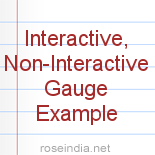Interactive, Non-Interactive Gauge Example



This example shows, how to create the Gauge class to draw the interactive and
non-interactive gauge which is used to display the volume label.
The javax.microedition.lcdui.Gauge class has only one constructor as:
Gauge(String label, boolean interactive, int maxValue, int initialValue):-
This is used to creates a new Gauge object with the given label, in
interactive or non-interactive mode, with the given maximum and initial values.
In this Interactive gauge example, we are using following methods:
- getMaxValue()
- getValue()
- isInteractive()
- setMaxValue(int maxValue)
- setValue(int value)
The Application is as follows:


Source Code of GaugeExample.java
import javax.microedition.lcdui.*;
import javax.microedition.midlet.*;
public class GaugeExample extends MIDlet implements CommandListener{
private Form form;
private Display display;
private Command back;
private String label1, label2;
private Gauge gauge1, gauge2;
public GaugeExample(){
label1 = new String("Interactive");
label2 = new String("Non-Interactive");
gauge1 = new Gauge("Interactive", true, 100, 40);
gauge2 = new Gauge("Static", false, 100, 40);
}
public void startApp(){
Form form = new Form("GaugeExample");
back = new Command("Exit", Command.EXIT, 0);
display = Display.getDisplay(this);
form.append(label1);
form.append(gauge1);
form.append(label2);
form.append(gauge2);
form.addCommand(back);
form.setCommandListener(this);
display.setCurrent(form);
}
public void pauseApp(){}
public void destroyApp(boolean unconditional){
notifyDestroyed();
}
public void commandAction(Command c, Displayable s){
String label = c.getLabel();
if (label.equals("EXIT")){
destroyApp(false);
}
}
}
|
Download Source Code





